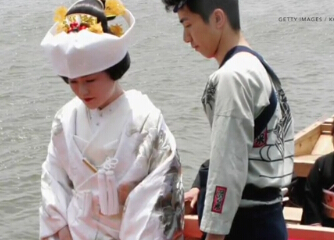In Japan, married couples must have the same last name — which means in most cases, women take their husband's surname.
在日本,已婚夫婦必須同姓—這意味著在大多數情況下,女方要跟著丈夫姓。
In 2011, a few women tried to challenge the 1896 law. But on Wednesday, Japan's supreme court ruled on the case, and it didn't budge.
在2011年,一些婦女試圖挑戰1896年制定的法律。但上星期三,日本最高法院就此案件進行裁決,并沒有動搖。
Japan isn't the only country that upholds an older law deciding the fate of a woman's surname. Greece, France and Italy have laws opposite of Japan's — they make it illegal for women to take their husband's last name.
日本并不是唯一維護舊法決定婦女姓氏命運的國家,希臘、法國和意大利的法律與日本相反,婦女與丈夫同姓是非法的。

Opponents see the Japanese court's decision as backsliding for women's rights, especially in a country where there's been a push to get more women in the workplace.
反對者認為日本法院的判決使婦女權利倒退,尤其在一個推動婦女工作的國家。
Japan ranked 101 out of 145 countries in this year's World Economic Forum gender gap index.
日本在今年的世界經濟論壇性別差距指數中,位于145個國家中的第101位。
Japanese marriages traditionally have focused on the two families becoming united rather than just the couple.
日本的婚姻傳統上是兩個家庭的結合,而不僅僅是夫妻倆。
譯文屬可可原創,僅供學習交流使用,未經許可請勿轉載。












